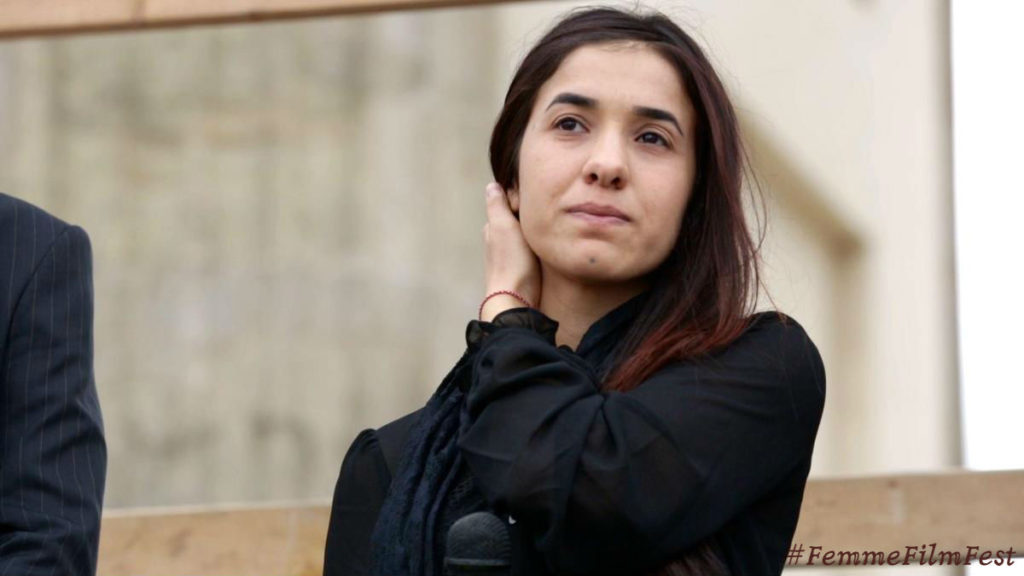There is a deeply unsettling feeling that the truly empathetic experiences when informed of atrocities, regardless of the medium of conveyance. Documentary filmmaking, with or without the inclusion of raw footage of surreal evil in action, is often the messenger of choice that provokes in viewers a blended mix of intense sorrow, rage, and desires for justice.
In Alexandria Bombach‘s On Her Shoulders, the sadly unique circumstances of Yazidi-Iraqi Nadia Murad’s pathway to global prominence as a survivor-turned-activist pleading with world leaders to stop ISIL’s ethnic/religious genocide of her people begun in August 2014, we are confronted with psyche-battering truth of what willful inaction permits the wretchedly anti-humane to carry out.
Driven by the carnage that claimed the lives of at least 18 members of her family, including Nadia’s mother, and the horrific sexual violence and human trafficking that she miraculously escaped, death threats fails to stop a young woman who has absolutely nothing to lose in the wake of repeated personal tragedies.
The person who makes Nadia’s pleadings to the United Nations and participating countries possible is Murad Ismael, co-founder and Executive Director of American-based humanitarian organization Yazda, which works to help liberate the Yazidi people from ISIL’s neverending crimes of genocide and human trafficking. Acting as Nadia’s public appearances coordinator, translator and surrogate father/brother, it is moving to see director Bombach’s dedication to capturing the development of Nadia and Murad’s familial relationship, which helps to sustain her in her quest for justice for her people.
The resistance to recognizing ISIL’s atrocities committed against the Yazidi people is quite unnerving to witness in On Her Shoulders. Nadia’s constant TV, radio, and governmental visits around the globe is a frustrating reminder of how often the already locally marginalized are further demeaned by the world over with universal indifference reminiscent of repeated false ignorance in human history. Including the well-known failure to stop the 1994 Rwandan genocide against the Tutsi, Twa, and moderate Hutu peoples.
One powerful ally that attracts massive attention to Nadia’s monumental cause for justice is Lebanese-British human rights barrister Amal Clooney. Presented by the world’s media outlets as the smart, glamorous wife of Hollywood multihypenate George Clooney, Amal utilizes her assigned pop culture capital to the fullest. To insure that her client achieves real judicial action against ISIL commanders whose coordinated crimes is referred to by Amal as a “bureaucracy of evil on an industrial scale.” Which has communicated their repulsive anti-Yazidi propaganda via Facebook.
Ironically, Amal’s statements on the evils of ISIL and the shamefulness of the world’s failure to intervene, occur during a September 2016 UN ceremony where Nadia is installed as the first-ever UNODC Goodwill Ambassador for the Dignity of Survivors of Human Trafficking.
Director/Cinematographer/Editor Alexandria Bombach has given the global population and the cinematic canon a permanent record of historic proportions. That exposes surreal trauma, genocide, targeted human trafficking of a disadvantaged people, and the will to save the survivors of a ravaged community. In which has been further destroyed by victim’s suicides as a desperate escape out of a living hell permitted by those with worldly authority who reject their right to a humane existence. The surrealism of indirect collaboration of global leaders with forces of radicalized evil, is a lesson that the young must not allow themselves to become as wretched as their predecessors in time.
Bombach shows us that in the midst of superficial media circuses, co-existence with an enduring trauma. Though with an even stronger resilience, Nadia Murad’s solitary call to action is a reminder that truth goes infinitely farther than a bullet.

